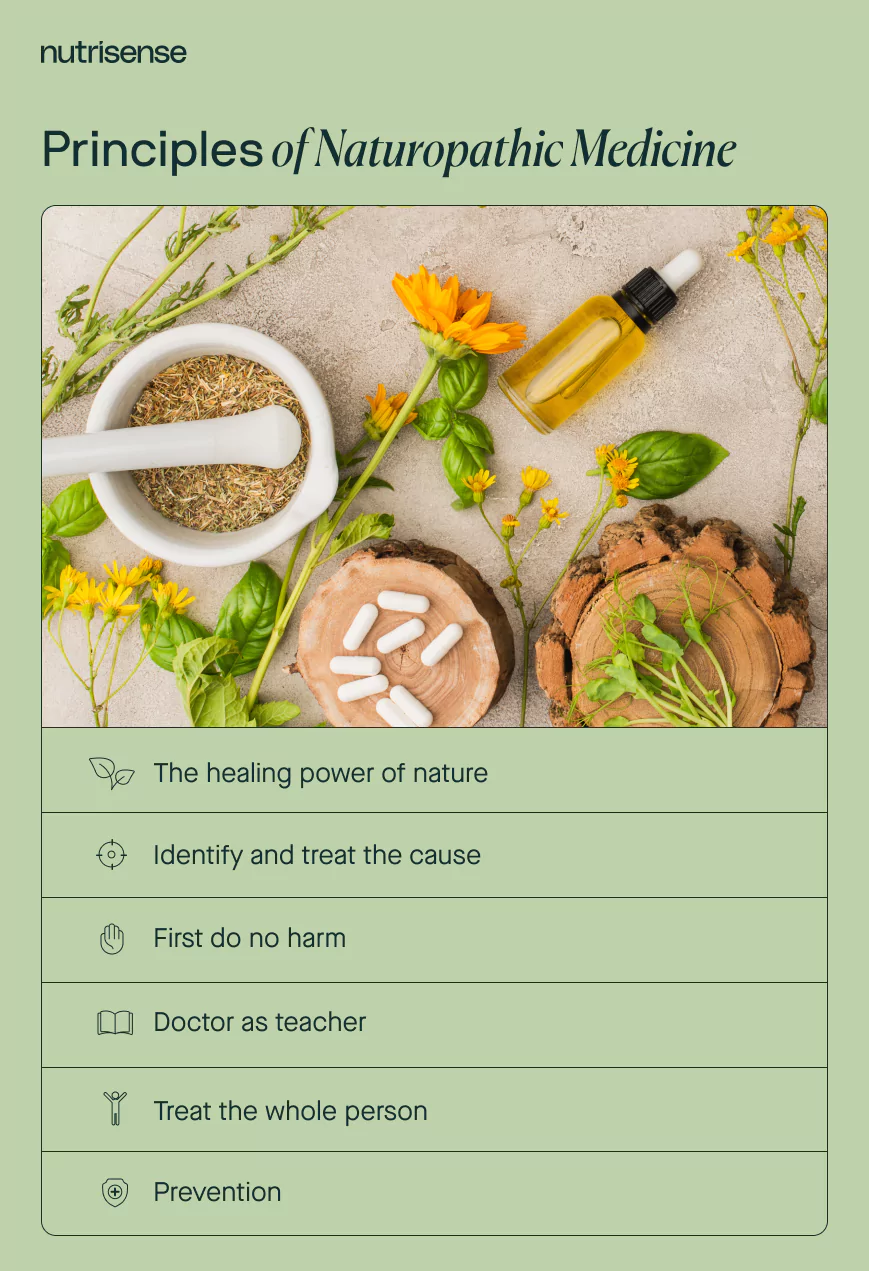What is Holistic Health?

Key Takeaways
Holistic health is a somewhat vague, catch-all term that usually refers to what others call complementary and integrative medicine. Essentially, this type of medicine seeks to improve a person’s health through interventions in multiple areas.
Complementary and integrative medicine is a practice of medicine that considers the importance of individuals as a whole, taking unique biological, behavioral, social, and environmental concerns into account.
So, what’s the difference between holistic, alternative, and western medicine? And are holistic approaches backed up by scientific evidence?
Keep reading to learn more about holistic health, including its benefits and some of the forms of holistic medicine practiced today.
Understanding Holistic Health

Holistic health practices are quite popular in other countries, with over 70 percent of the population of India, Canada, and many African countries practicing holistic health. This type of medicine is also surging in popularity in the U.S., with nearly 50 percent of the U.S. population using some form of complementary and integrative medicine.
Rather than focusing on one area of a person’s health, holistic health care seeks to combine conventional medicine approaches, like prescription medications and physical rehabilitation, with complementary approaches, including yoga, acupuncture, Ayurveda, and herbal medicine.
Holistic medicine is not meant to replace conventional medical care. Instead, it is often recommended as a complement to conventional treatments.
Some researchers have suggested that there is no “alternative medicine” in principle, since any approach that has been shown to provide evidence-based benefit by scientific methods of analysis is considered valid medicine, regardless of its type. In this way, all medicine might be divided into two groups: types of medicine that have evidence-based support and types of medicine that don’t.
The Many Benefits of Holistic Health

Rather than just treating diseases and chronic illnesses as they appear, holistic health is focused on prevention. If practiced along with conventional medicine, some holistic treatments have been linked to positive effects.
Here are some of the notable benefits that holistic healthcare may have on your overall health and well-being.
Changed and Improved Habits
Because holistic health is focused on the whole person, it often includes multiple practices including diet and lifestyle interventions. Holistic practices like yoga and meditation may require consistent practice, and may lead to new and improved habits over time. Many of these practices have also been linked to improved mental health and lower rates of stress, anxiety, and depression and can be practiced as a form of self-care.
It’s also important to note that while some practices may be considered “holistic” such as nutrition approaches, this doesn’t mean that they lack evidence in general. In fact, nutrition science as a discipline is heavily rooted in the biological science of biochemistry. However, different types of nutritional approaches or interventions may not all be created equal in terms of their scientific backing. .
Prevention from Sickness and Illness
Conventional medical practices tend to focus on treating symptoms of a disease or illness that has already occurred, whereas many holistic healing practices, like some areas of naturopathy, are focused on prevention.
Focusing on whole-person health could involve physical activity, diet and nutrition interventions, and mental healthcare, all of which have been shown through scientific methods to reduce the risk of certain diseases.
Relies on the Power of Nature

Many holistic practices, like Ayurveda or Traditional Chinese Medicine (TCM), make use of herbs and other elements from nature. Plants have many compounds that have been shown to influence and potentially improve health outcomes for some people.
Herbal medicine may often be more affordable, though safety concerns may still exist when compared to more traditional approaches. Most herbal remedies and so-called natural medicines are used to treat chronic illnesses, as opposed to acute conditions.
While they may be helpful in some cases, natural interventions should not replace conventional healthcare and traditional medicine.
Promotes a Well-Balanced Lifestyle
Holistic healthcare focuses on multiple aspects of wellness, including physical health, spiritual health, and emotional health. Integrating these aspects of your health may help promote a balanced lifestyle.
Drawbacks to Holistic Health
While there do appear to be some benefits to holistic healthcare depending on the type, there are some downsides as well. Here are a few potential drawbacks to certain holistic health approaches.
Lack of Scientific Evidence

Some holistic practices may have insufficient evidence, low-quality studies, or very limited research behind them. Before considering complementary and integrative medicine, talk to your doctor and ask yourself the following questions:
- Are the claims of this practice backed by quality scientific evidence?
- What is the source of this evidence?
Be on the lookout for terms like “miracle cure,” “secret ingredient,” “scientific breakthrough,” and a “quick fix” that departs from previous research. You may also want to check if the federal government has weighed in on the practice. Some places to get more information include:
- The National Center for Complementary and Integrative Health
- The Food and Drug Administration
- The Federal Trade Commission
- You can also gain insight into peer-reviewed published research in literature databases like PubMed
Not Applicable in Emergency Situations
Holistic healthcare is often used as a preventative measure or treatment for chronic health issues. It is not considered by researchers to be a replacement for emergency care in emergency or life-threatening situations. If you are experiencing a medical emergency, call 911.
7 Examples of Holistic Health
As we’ve mentioned, holistic health seeks to treat the whole person. This means that holistic practices may take psychological, physical, biological, and social factors into account.
Here are a few examples of complementary and integrative health practices that can fall under the umbrella of holistic health.
Naturopathy

Naturopathy, or naturopathic medicine, is a branch of medical practice that has its roots in 19th century European practices. Naturopathic practitioners make use of a variety of treatment approaches including diet and lifestyle changes, stress reduction, homeopathy, herbs and dietary supplements, and exercise therapy, among others.
Naturopathic medicine operates under six principles:
- The Healing Power of Nature, which recognizes that the human body has an inherent self-healing process.
- Identify and Treat the Cause, which states that a naturopathic physician’s job is to identify and remove underlying causes of illness rather than just treating symptoms.
- First Do No Harm, which involves acknowledgement and respect of a patient’s self-healing practice, avoiding the harmful suppression of symptoms, and using the least force necessary to diagnose and treat illness.
- Doctor as Teacher, which holds that part of the job of a naturopath is to educate patients and encourage self-responsibility for help.
- Treat the Whole Person, which involves taking into account an individual’s physical, mental, emotional, genetic, environmental, spiritual and social factors.
- Prevention, which emphasizes the prevention of disease by assessing risk factors, heredity, and susceptibility to disease, and making appropriate interventions.
A naturopathic physician typically completes a four year grad-level program and an accredited naturopathic medical school. Some U.S. states require further licensing requirements.Traditional naturopaths, on the other hand, may receive other types of training and are not accredited by the U.S. Department of Education.
If you wish to visit a naturopathic physician, talk to your current healthcare team and be sure to fill them in on any complementary or integrative health approaches you are considering or using.
Ayurveda

Ayurveda is an ancient holistic medical system from India. It is one of the world’s oldest medical systems, and is still in practice in India today. Ayurvedic medicine combines plant medicine, diet, exercise and lifestyle interventions to build and maintain balanced functioning of the mind and body.
Ayurvedic treatment seeks to eliminate so-called impurities, reduce uncomfortable symptoms, increase resistance to disease, reduce stress, and increase harmony in life. It can include diet interventions, massage therapy, yoga, and meditation. Herbs, common spices, and oils are used in Ayurvedic treatment.
In India, Ayurveda practitioners must undergo accredited, state-recognized training. In the United States, there is no such licensure or national training standard for Ayurvedic practitioners.
Some herbal remedies used in Ayurveda may have negative side effects if used without the direction of a holistic health practitioner. Talk to your doctor before using any Ayurvedic products, especially if you are pregnant or breastfeeding.
Acupuncture
Acupuncture is a technique that involves the insertion of fine needles into the skin. This practice originated in Traditional Chinese Medicine (TCM) and has been used in some form for at least 2,500 years.
The way acupuncture works isn’t fully understood by researchers, but there is evidence that it affects the nervous system and has effects on connective tissues where the needles are inserted. It is most commonly used for pain, such as back, joint, or neck pain in the United States.
Acupuncture may also have placebo effects due to the patient’s belief in the treatment or other indirect causes. If you are interested in trying acupuncture, talk to a trusted medical provider first, but keep in mind that this practice should not replace conventional medical treatment.
Chiropractic

Chiropractic is a form of holistic medicine that involves manual therapy to treat problems affecting the musculoskeletal system. Typically, licensed chiropractors interview you before treatment to obtain a detailed health history and develop a working diagnosis before establishing a treatment plan.
Chiropractic care uses many methods of treatment, including stretching, sustained pressure to specific joints, and spinal manipulations.
To practice in the United States, chiropractors earn a Doctor of Chiropractic degree from an accredited program, pass an exam, and hold a state license. If you are interested in trying chiropractic, ask your doctor for help identifying a reputable practitioner.
Aromatherapy
Aromatherapy is the practice of using essential oils from flowers, herbs, and trees for health benefits. These oils are most often inhaled or applied in a diluted form onto the skin. Essential oils used in aromatherapy include Roman chamomile, geranium, tea tree, lavender, lemon, ginger, and bergamot.
Aromatherapy is often used for insomnia, incorporated into massage therapy, and to positively affect mood, but more rigorous research is needed to determine if aromatherapy is beneficial for health conditions.
Meditation
Meditation is a practice that goes back thousands of years and focuses on mind and body integration to quiet the mind and enhance well-being. It is often characterized by paying attention to the present moment with openness and acceptance while focusing on the breath.
There are many forms of meditation, including focusing on a particular sensation like breathing, visual images, or a mantra, and mindfulness, which involves maintaining awareness of the present moment without making judgements.
Meditation and mindfulness may help people improve their quality of life and sense of overall well-being. However, research on further health benefits is still in preliminary stages. If you are interested in trying meditation, visit mindful.org for some tips.
Yoga

Yoga is an ancient practice that originated in India. It originated as a spiritual practice with many complex elements, but a yoga practice in the United States typically involves physical postures, breathing techniques, and meditation.
Yoga is practiced in many styles, from gentle to physically rigorous. However, the diversity of yoga practices can make it difficult for researchers to measure the effects of yoga on well-being.
Many studies on yoga’s effectiveness have had small sample sizes or have not been high quality. Therefore, it may be more accurate to say that yoga shows promise for health applications.
Yoga is generally considered safe for healthy people, when practiced correctly under the guidance of a qualified instructor. The risk of injury associated with yoga is generally low, but you should talk to your doctor before practicing any new physical activity.
Find the right Nutrisense programto turn insight into progress.
Go Beyond Glucose Data with Nutrisense
Your glucose can significantly impact how your body feels and functions. That’s why stable levels are an important factor in supporting overall wellbeing. But viewing glucose isn't enough. Nutrisense, you’ll be able to learn how to use your body's data to make informed lifestyle choices that support healthy living.
One-to-one coaching
Sign up to access insurance-covered video calls to work with a glucose expert: a personal registered dietitian or certified nutritionist who will help tailor your lifestyle and diet to your goals.
Monitor and measure what matters
With the Nutrisense CGM Program, you can monitor your glucose with health tech like glucose biosensors and continuous glucose monitor (CGM)s, and analyze the trends over time with the Nutrisense App. This will help you make the most informed choices about the foods you consume and their impact on your health.
Find your best fit
Ready to take the first step? Start with our quiz to find the right Nutrisense program to help you take control.

Heather is a Registered and Licensed Dietitian Nutritionist (RDN, LDN), subject matter expert, and technical writer, with a master's degree in nutrition science from Bastyr University. She has a specialty in neuroendocrinology and has been working in the field of nutrition—including nutrition research, education, medical writing, and clinical integrative and functional nutrition—for over 15 years.


.webp)

